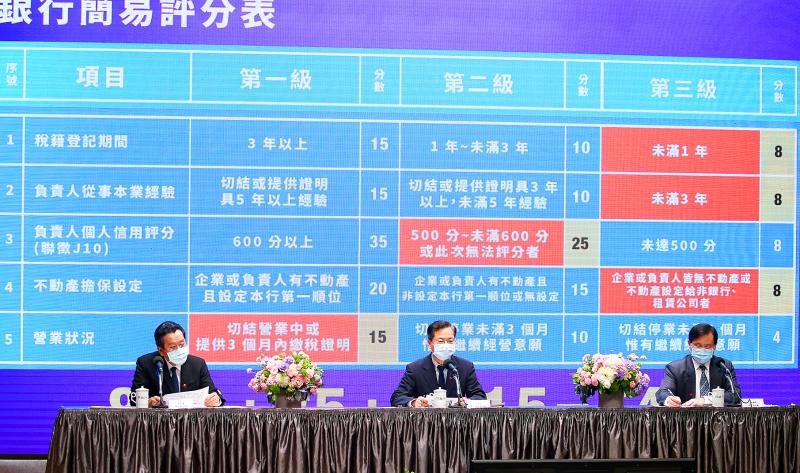Local banks had approved 8,254 loan applications totaling NT$124 billion (US$4.16 billion) for businesses affected by the COVID-19 pandemic as of Wednesday last week, a surge of 63 percent and 51.9 percent respectively from a week earlier, according to figures released by the Financial Supervisory Commission (FSC).
Seventy-two percent of the loans, or NT$89.9 billion, were provided to 7,778 companies under a Ministry of Economic Affairs assistance program for the nation’s manufacturers and small and medium-sized enterprises, commission data showed.
The ministry last month announced that it would subsidize interest payments for companies whose revenue dropped by at least 15 percent from last year’s average, on condition that the companies do not reduce their employees’ working hours or salaries.

Photo: CNA
Another 27.5 percent of the loans, or NT$34.1 billion, were offered to 473 tourism agencies, airlines, hotels and transportation firms. The Ministry of Transportation and Communications is to help subsidize those firms with interest payments and handling fees.
A total of 1,600 farmers, fishers and other agricultural businesses were granted loans totaling NT$8 million, while two cultural businesses were granted loans of NT$1.95 million, the data showed.
As for affected companies or individuals who do not qualify for the government’s relief program, banks approved 27,436 applications for loan extensions or new loans totaling NT$234.2 billion, the commission said.
Overall, banks had offered NT$358.33 billion to 35,690 affected firms as of Wednesday last week, the data showed.
Seventy-one percent of the loans, or 19,264 applications for NT$254.4 billion, were provided by state-run banks, for an average of NT$13 million per application, while private banks lent NT$103.9 billion to 16,426 firms, for an average of NT$6.32 million per application, data showed.
State-run Bank of Taiwan (臺灣銀行) ranked first, granting loans totaling NT$69.3 billion to 2,568 companies or individuals, the commission said.
Cathay United Bank (國泰世華銀行) ranked first among private banks with loans of NT$21.3 billion, followed by Taichung Commercial Bank (台中商銀) with NT$14.9 billion and E.Sun Commercial Bank (玉山銀行) with NT$11.3 billion, commission data showed.
Separately on Friday, several labor advocates said that employees had been left behind by the government’s economic stimulus plans.
Although Taiwan has so far been spared the worst of the pandemic, many workers in affected industries have been furloughed, Confederation of Taipei Trade Unions president Cheng Ya-hui (鄭雅慧) said.
Cheng said that labor groups “have had to push the government every step of the way” to secure stimulus funding, while the government’s industry-by-industry approach has led to waste.
Taiwan Confederation of Trade Unions president Chuang Chueh-an (莊爵安) on Friday said that stimulus benefits — mainly low-interest loans and cash payments for low-income earners — should be increased and made more accessible.
Additional reporting by CNA

The New Taiwan dollar is on the verge of overtaking the yuan as Asia’s best carry-trade target given its lower risk of interest-rate and currency volatility. A strategy of borrowing the New Taiwan dollar to invest in higher-yielding alternatives has generated the second-highest return over the past month among Asian currencies behind the yuan, based on the Sharpe ratio that measures risk-adjusted relative returns. The New Taiwan dollar may soon replace its Chinese peer as the region’s favored carry trade tool, analysts say, citing Beijing’s efforts to support the yuan that can create wild swings in borrowing costs. In contrast,

Nvidia Corp’s demand for advanced packaging from Taiwan Semiconductor Manufacturing Co (TSMC, 台積電) remains strong though the kind of technology it needs is changing, Nvidia CEO Jensen Huang (黃仁勳) said yesterday, after he was asked whether the company was cutting orders. Nvidia’s most advanced artificial intelligence (AI) chip, Blackwell, consists of multiple chips glued together using a complex chip-on-wafer-on-substrate (CoWoS) advanced packaging technology offered by TSMC, Nvidia’s main contract chipmaker. “As we move into Blackwell, we will use largely CoWoS-L. Of course, we’re still manufacturing Hopper, and Hopper will use CowoS-S. We will also transition the CoWoS-S capacity to CoWos-L,” Huang said

VERTICAL INTEGRATION: The US fabless company’s acquisition of the data center manufacturer would not affect market competition, the Fair Trade Commission said The Fair Trade Commission has approved Advanced Micro Devices Inc’s (AMD) bid to fully acquire ZT International Group Inc for US$4.9 billion, saying it would not hamper market competition. As AMD is a fabless company that designs central processing units (CPUs) used in consumer electronics and servers, while ZT is a data center manufacturer, the vertical integration would not affect market competition, the commission said in a statement yesterday. ZT counts hyperscalers such as Microsoft Corp, Amazon.com Inc and Google among its major clients and plays a minor role in deciding the specifications of data centers, given the strong bargaining power of

TARIFF SURGE: The strong performance could be attributed to the growing artificial intelligence device market and mass orders ahead of potential US tariffs, analysts said The combined revenue of companies listed on the Taiwan Stock Exchange and the Taipei Exchange for the whole of last year totaled NT$44.66 trillion (US$1.35 trillion), up 12.8 percent year-on-year and hit a record high, data compiled by investment consulting firm CMoney showed on Saturday. The result came after listed firms reported a 23.92 percent annual increase in combined revenue for last month at NT$4.1 trillion, the second-highest for the month of December on record, and posted a 15.63 percent rise in combined revenue for the December quarter at NT$12.25 billion, the highest quarterly figure ever, the data showed. Analysts attributed the